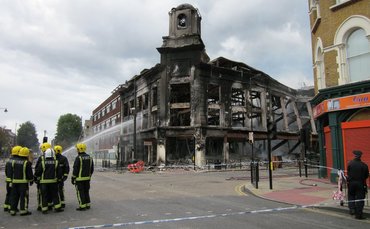
UK riots: Reading the riot act
The out-dated Riot Damages Act, policyholder confusion and poor communication led to some heavy criticism of the industry's handling of last year's riots - but what has been learnt and what still needs to change?

They were scenes that rocked the nation: buildings burnt to the ground, police pelted with rocks and cars overturned.
When riots broke out in London on 6 August last year, following the fatal shooting of Mark Duggan by police in Tottenham Hale, areas across the capital went up in flames.
Over the next five days, the disturbances spread to Manchester, Birmingham and Liverpool, with thousands joining in. By 11 August, five people were dead.
According to a report entitled 5 Days in August, compiled by the Riots Communities and Victims Panel, a committee set up by the government to investigate the unrest, more than 5000 crimes were committed and more than 4000 people arrested.
But, one year on, what has it all meant for the insurance industry? The Association of British Insurers estimated the pay-out to policyholders at £200m. However, in the first days following the unrest, the focus was not on the cost of claims but on mobilising assistance.
Malcolm Hyde, executive director of the Chartered Institute of Loss Adjusters, says the response was swift: "We had members on every aspect of the riots, and within one weekend two firms set up helplines for the uninsured to handle the first notification to police. Achieving that so quickly was testament to the skills loss adjusters have."
However, it soon became clear that the current legislation guiding the response to the unrest, the Riot Damages Act, might be problematic.
The 1886 Act enables communities affected by riots to claim damages from the relevant police authorities. Uninsured and underinsured parties can be compensated, while insurers can recover compensation paid to riot-affected policyholders from the police.
Inevitably, with legislation that is more than 100 years old, and damages calculated in shillings and pence, not to mention handwritten claims forms, its draftsmen failed to consider the plight facing 21st century Londoners.
More of a concern, however, was the time limit. Claims needed to be filed within 14 days, and the authorities decided whether the riot, defined as a gathering of 12 or more people using violence in a common purpose, had caused the losses.
The Act also provides no definitive answer on whether business interruption is covered, which is crucial for insurers facing large payouts to firms that were unable to trade owing to the unrest.
This issue remains unresolved. The situation forced insurers to keep detailed notes on full-coverage policyholders and the underinsured, and caused confusion for claimants, who were largely unsure where to present their claims.
Lack of protocol
"It was fairly clear we'd not agreed a protocol," says Martin Ashfield, commercial property claims director at Axa commercial lines and personal intermediary.
"There wasn't a common way of reporting the claims through to the police, and then there was the time limit, which was a major headache."
The government soon extended the time limit to allow 42 days for the submission of claims filed under the Act, but this did not entirely solve the problem, as Hyde explains: "There was little guidance about who had to sign the form and how much detail was needed.
"The burden of proof insurers expected was at one level, but the degree the police expected from insurers was much greater. If insurers have a direct right to recover under the Act, the burden of proof needed to be the same."
Allianz property claims director Harry Rule agrees that harmonising the vested interests was frustrating.
"In the early stages, there were some points of tension. This comes from the fact none of us has any great experience dealing with riot claims against police authorities," he said.
Insurers take flak
Despite the challenges, insurers felt they fared well, but a few months after the riots, complaints against insurers began to flood in, and the industry was accused of failing to pay promptly.
David Lammy, the Labour MP for Tottenham, was the most outspoken critic. "The insurance companies have been woeful. Shame on them, particularly Zurich, for the way they have treated people," he said on BBC Radio 5 Live in November.
Zurich property claims director Jon Cawley subsequently sat down with Lammy to identify the root cause of his accusations and any problems.
According to Cawley, once they discussed the matter, Lammy realised that there was confusion around claims and claiming under the Act from the insured and the uninsured.
"He was very satisfied and understood exactly what we'd been doing. A learning point was the importance of communication issues," Cawley says.
Nevertheless, complaints continued to surface into 2012. In June, Lammy and Sir William Castell, head of the High Street Fund, which provided emergency grants to riot-affected businesses, castigated insurers, revealing at a London Assembly meeting that businesses were still awaiting payments.
Insurers found themselves under the spotlight again at a subsequent Assembly meeting in July attended by Jonathan Clark, director of corporate and technical risk at Cunningham Lindsey, Nick Starling, director of general insurance at the ABI, David Williams, then claims and underwriting director at Axa, and political and police representatives.
A fierce debate broke out between Starling and Andrew Dismore, Assembly member for Barnet and Camden, on the settlement of claims.
Quoting an ABI riots report from May, Dismore told Starling: "[You said:] 'Insurers reacted quickly to help thousands of customers recover.' But that is not true is it?
"If we look at the figures you put out in December 2011, you are talking about the business claims there, and 732 had been settled five months after.
"If we go right through to May, just a week or so before your report, even then only 828 (70%) SME cases had been settled, and 209 (56%) claims had been settled in full for large commercial organisations. That is not thousands of customers, is it?"
Unsurprisingly, Starling and others in the industry defended the numbers, explaining the confusion between full and interim settlements.
Dismore still believes the insurance industry is too focused on defending itself, which worsens its reputation among affected policyholders.
He tells Post: "The insurance industry spends a fortune on PR and spin to try to get its perspective across, but I go by what the people who are actually insured say.
"The industry needs to think about the complaints it received and stop pretending everything in the garden is rosy.
"Insurers need to go back and talk to people whose cases they have settled to get feedback about what could be done better.
"Policyholders need to know claims are going to get paid out fairly and promptly, and I don't think months and months later is promptly."
Meanwhile, Angie Bray, the Conservative MP for Ealing Central and Acton, agrees that the response from insurers towards her constituents was "patchy".
"It felt as if the industry was not reacting as quickly as it had been encouraged to do by politicians and others, and inevitably a number of those impacted by the riots felt there was a lack of sympathy towards their claims," she said.
Two sides to the story
This difference in opinion will be examined in a new report from the London Assembly due to be published later this month, but in the interim each side seems to be sticking to its beliefs.
"I don't wish to sound paranoid but it does seem that insurers are a target for criticism. It's frustrating but it seems to be the way of the world," says Rule.
Brokerbility chairman Ashwin Mistry adds that many commentators do not recognise the difficult job insurers have to perform.
"It's very easy for people to be critical from the outside without realising what insurers have to go through. We're not magicians," he said.
While disagreements on response times continue, one thing that is evident is the need for more clarity in the Riot Damages Act, including how police authorities should handle claims and what the Act covers.
The final report from the Riots Communities and Victims Panel in March alleviated some pressure on the insurance industry by noting poor settlement times from police authorities.
It stated: "By March 2012, the Metropolitan Police Service had settled only 396 claims of the 2538 lodged by insurers.
"For uninsured claims, at the time of this report police authorities had settled barely half of all valid claims. There are still small businesses which have yet to receive a penny in compensation for the losses they have experienced."
"By comparison, insurance companies have now settled, or made interim payments, in the vast majority of the claims they have received."
Tim Humphreys, an ABI policy adviser, believes that the panel's comments will get the ball rolling on updating the Act, which could save time, money and frustration in the future.
"It agreed that the fundamental principles of the Act need to be retained, in other words sharing the risks of riots between the public sector and the private sector, in this case the insurers," he says.
"It also agreed that the Act needs reform. And, since the panel was set up by the Prime Minister, his deputy and the opposition leader, what it says has a lot of weight."
A Home Office spokesman confirms that reforms are being investigated, but could not say when they might be more seriously debated.
Humphreys says there needs to be research into why so many people affected by the riots failed to have sufficient cover.
"The degree of underinsurance in the affected communities was significant. We need to look at that as an industry. Was it the cost, or issues around communication?" he adds.
Communication is key
The fundamental need for clearer communication is undoubtedly the number one lesson learned from the riots.
"We probably felt we were communicating well, but where there are multiple claimants in close proximity you have to keep looking at how you communicate," says Clark.
"We must never forget that people are making claims in what is a very distressing situation for them, and from time to time there will be criticisms that insurers haven't responded in the manner they were looking for.
"The industry mobilised and sought to communicate, and it can continue to improve."
Hyde, meanwhile, focuses on the opportunities to make things more straightforward in the future.
"We're fortunate in this country that we don't have many riots. Now we have an opportunity to fix the Act, and we should take it," he says.
However, he also stresses that the victims must not be forgotten. "That human side shouldn't go unnoticed. It wasn't a pleasant experience, but that's why the industry exists," he concludes.
Timeline: London Riots
4 August 2011
Police shoot 29 year-old Mark Duggan after stopping him in a taxi in Tottenham. He dies at the scene
6 August 2011
Duggan's friends and family gather outside Tottenham police station for a peaceful protest. About 200-300 people join the demonstration, which descends into a riot. The unrest spreads throughout London and other major UK cities in the following days
September 2011
The British Insurance Brokers' Association urges the government to change the Riot Damages Act notification period permanently from 14 to 42 days
November 2011
Tottenham MP David Lammy says the response of insurance companies following the riots, particularly Zurich, was "woeful"
Government-backed report, 5 Days in August, slates insurers for slow and inadequate claims payments and for failing to help claimants
December 2011
MPs on the Home Affairs Committee urge the government to speed up payments to victims of future riots and permanently extend the claims application deadline from 14 to 42 days
March 2012
A report by the Riots Victims and Communities Panel praises the insurance industry for settling 90% of domestic claims, while the police are criticised
An estimated £80m claim for the destroyed Sony warehouse is rejected by the Mayor's Office for Policing and Crime, which states that the damage was not caused by people "riotously and tumultuously assembled"
May 2012
The ABI calls for an overhaul of the Riot Damages Act as part of its review, £40m a Day - Counting the Financial Cost of the August 2011 Riots
June 2012
The insurance industry's response to the riots is slammed at a London Assembly meeting
July 2012
The ABI accuses the riot compensation scheme of "failing too many Londoners"
August 2012
The Chartered Institute of Loss Adjusters calls for major reforms of the Riot Damages Act
The riots in numbers
5
Days the riots lasted, between 6 and 10 August 2011
126
Age in years of the current riot legislation, the Riot Damages Act
2710
The number of people who appeared in court following the riots
£80m
Estimated claim for the destroyed Sony warehouse in London
£200m
The Association of British Insurers' estimated cost of the riots
(Sources: ABI, Metropolitan Police)
The Claims Event
The Claims Event 2012 takes place on 10 October at The Mayfair, London. For more about the London riots and how they have changed the industry, visit the Claims Event 2012 website or email charlie.hallett@incisivemedia.com to book your place.
Only users who have a paid subscription or are part of a corporate subscription are able to print or copy content.
To access these options, along with all other subscription benefits, please contact info@postonline.co.uk or view our subscription options here: http://subscriptions.postonline.co.uk/subscribe
You are currently unable to print this content. Please contact info@postonline.co.uk to find out more.
You are currently unable to copy this content. Please contact info@postonline.co.uk to find out more.
Copyright Infopro Digital Limited. All rights reserved.
You may share this content using our article tools. Printing this content is for the sole use of the Authorised User (named subscriber), as outlined in our terms and conditions - https://www.infopro-insight.com/terms-conditions/insight-subscriptions/
If you would like to purchase additional rights please email info@postonline.co.uk
Copyright Infopro Digital Limited. All rights reserved.
You may share this content using our article tools. Copying this content is for the sole use of the Authorised User (named subscriber), as outlined in our terms and conditions - https://www.infopro-insight.com/terms-conditions/insight-subscriptions/
If you would like to purchase additional rights please email info@postonline.co.uk







